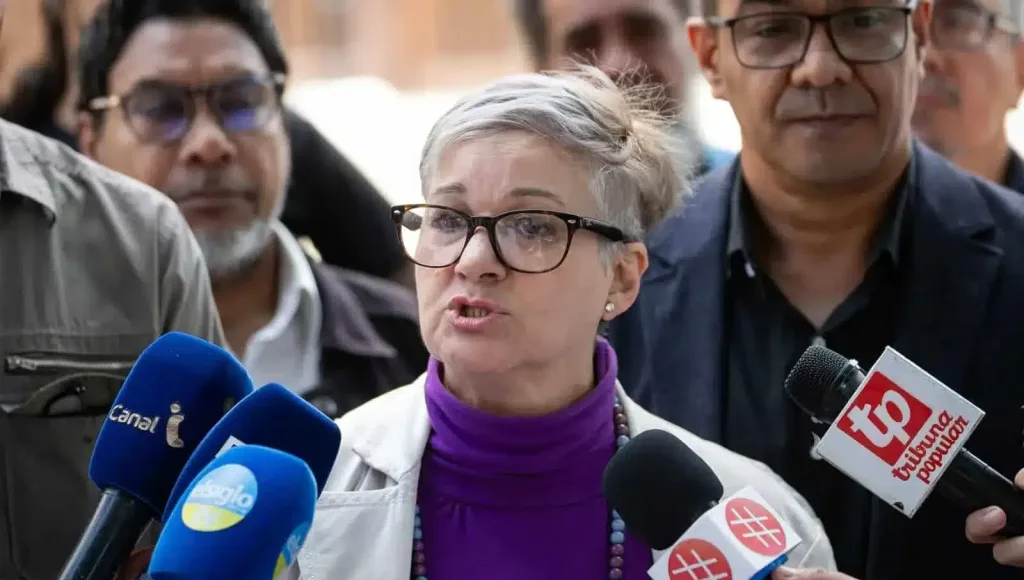
Venezuelan lawyer Maria Alejandra Diaz issuing a statement to the press in 2024; she is escorted by Venezuelan Communist Party members, including the secretary general, Oscar Figuera. Photo: Ronald Peña R./EFE/file photo.

Orinoco Tribune – News and opinion pieces about Venezuela and beyond
From Venezuela and made by Venezuelan Chavistas

Venezuelan lawyer Maria Alejandra Diaz issuing a statement to the press in 2024; she is escorted by Venezuelan Communist Party members, including the secretary general, Oscar Figuera. Photo: Ronald Peña R./EFE/file photo.
Caracas (OrinocoTribune.com)—Ex-Chavista lawyer María Alejandra Díaz confirmed Sunday, August 17, that she is in Colombia after reporting earlier this month that Nicolás Maduro’s administration denied her safe passage to “leave under diplomatic protection.”
In a social media post, Díaz explained that she exited the Colombian Embassy residence in Caracas after Colombia granted her political asylum, as confirmed by Colombia’s foreign ministry on August 6.
The lawyer thanked Gustavo Petro’s government, Foreign Minister Yolanda Villavicencio, Ambassador Milton Rengifo, and “dozens of unsung heroes,” without clarifying if Venezuela granted her safe passage.
COMUNICADO
Por esta vía informo oficialmente que gracias a las gestiones del gobierno del presidente .@petrogustavo de la Canciller .@ryvillavicencio, así como del embajador Milton Rengifo y a la colaboración de decenas de héroes anónimos, que logramos salir de la Residencia del… pic.twitter.com/Cu5dHJ0558— María Alejandra Díaz Marín🐞🦗🦎🐝🐜 (@MariaesPueblo) August 18, 2025
“We exited the Colombian ambassador’s Caracas residence and are safely in Colombian territory with family,” she said.
Colombia granted asylum to María Alejandra Díaz
Colombia confirmed Díaz’s diplomatic asylum August 6. “On January 11, 2025, Colombia granted diplomatic asylum to Venezuelan citizen María Alejandra Díaz Marín, who claimed politically motivated persecution by Venezuela,” the Colombian Foreign Ministry stated after Díaz reported receiving asylum at Colombia’s Caracas embassy since January.
Colombia’s ministry added: “Venezuela has stated through diplomatic channels that no safe-conduct pass is necessary for Ms. Díaz Marín, as no arrest warrant or judicial process exists against her.”
Colombian President Gustavo Petro confirmed Monday that Díaz entered Colombia following January’s asylum grant: “Colombia guarantees political asylum. We await return of all Colombians detained in Venezuela.”
Who is María Alejandra Díaz
In October 2024, the coalition of former Chavistas known as the Popular Democratic Front (FDP)—which Díaz joined after distancing herself from the Chavista movement—filed a Supreme Court appeal demanding disaggregated presidential election results. The court rejected it in November 2024.
The Popular Democratic Front (FDP), now defunct, included political organizations that claimed to be Chavistas such as the historical Venezuelan Communist Party (PCV) and Homeland for All (PPT), among others.
Previously, the PSUV and Maduro government granted Díaz TV prominence through frequent appearances on news programs such as Mario Silva’s La Hojilla, among many others.
Venezuela’s Constitutional Court fined Díaz—who supported the FDP request—and ordered the Caracas Bar Association to begin “disciplinary proceedings” against her on November 2024. The court temporarily suspended her law license and requested administrative sanctions.
Díaz served on the 2017 National Constituent Assembly (ANC) during far-right opposition protests (guarimbas) that caused over 100 deaths. She chaired its Human Rights Commission.
A former United Socialist Party (PSUV) member, she distanced herself from the Chavista movement in 2020 when—as an ANC delegate—she abstained from voting on the Anti-Blockade Law. Following its approval, she complained that ANC members lacked access to the bill before the vote: “No legislative emergency overrules the principle that sovereignty resides inalienably in the people.”
Venezuelan NGO ‘Activist’ Released From Prison—Legal Process Ongoing
“Abstaining resolves an ethical dilemma—not following overwhelming majorities or crushed minorities but opposing underlying reasons for the vote,” she responded after ANC colleagues Francisco Torrealba and Gladys Requena criticized her.
For the 2024 presidential elections, the Communist Party (PCV) proposed Díaz as a candidate. The initiative failed after PCV and Homeland for All (PPT) lost their electoral “ticket” through a judicial process transferring control of those parties to PSUV-aligned forces.
Special for Orinoco Tribune by staff
OT/JRE/SL